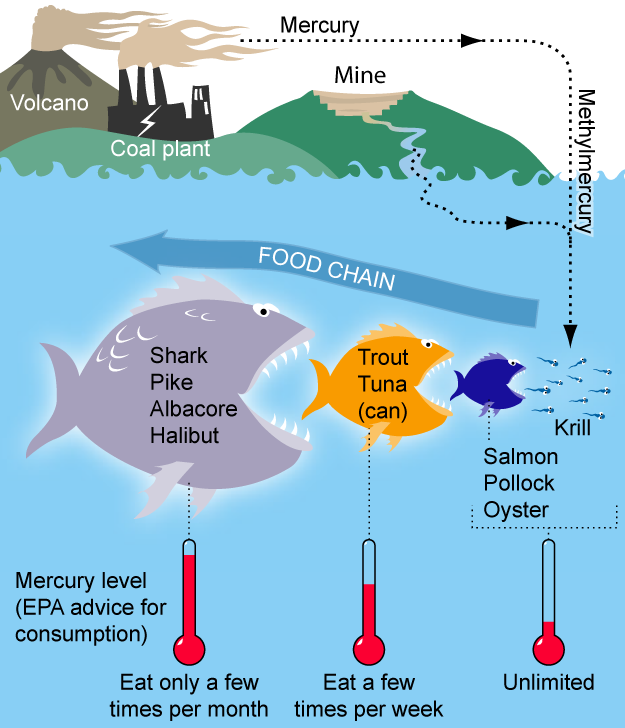I’m on the visionary panel. To register, click here.

Earlier this week, President Obama announced a plan to reduce toxic emissions from coal-burning power plants. The purpose of the EPA’s Clean Power Plan is to reduce greenhouse gases that contribute to climate change.
But from the standpoint of food politics, the new rules do something really important. They will force coal-burning power plants to further reduce emissions of mercury.
In 2005, the EPA promulgated a rule to control mercury emissions from fossil fuel-fired power plants under section 111(d): the Clean Air Mercury Rule (CAMR). The EPA established a nationwide cap-and-trade program that took effect in two phases: In 2010, the cap was set at 38 tons per year, and in 2018, the cap was lowered to 15 tons per year. The EPA expected, on the basis of modeling, that sources would achieve the second phase, 15-ton per year cap cost-effectively by choosing among a set of measures that included shifting generation to lower-emitting units.
Mercury from coal-burning power plants is the largest human-induced source of methymercury in the fish food chain, accounting for 40% of the amount that gets into oceans (most of the rest comes from underseas volcanos). Mercury is converted to toxic methylmercury in seawater, and the toxin moves up the fish food chain as bigger fish eat smaller fish. Methylmercury does very bad things to the nervous system of the growing fetus (recall the mass poisonings in Minamata, Japan in the 1950s and the shocking photos of the victims).
 Fish advisories
Fish advisories
Large, predatory fish have the most methymercury and should not be eaten in large amounts, or at all by pregnant women.
Fish advisories expect pregnant women to know the kinds of fish they can and cannot eat, and how much. This is not easy.
Wouldn’t it be better to prevent mercury from getting into seawater in the first place?
I like to use eliminating methylmercury as an example of why public health (“upstream”) approaches work better than personal responsibility (“downstream”) approaches.
An exceptionally clear example is how to avoid toxic levels of methylmercury in fish. We can teach pregnant women to recognize which fish are high in methylmercury and hope this works well enough so they will avoid buying such fish (personal responsibility) or we could–as a society–require coal-burning power plants to scrub their emissions so mercury doesn’t get into ocean or lake waters in the first place (public health).
That’s what this rule does.
For explanations of how the Clean Power Plan will work, see the Union of Concerned Scientists’ review.
Vox.com explains:
The basics of the Clean Power Plan are fairly simple. The EPA is giving each state an individualized goal for reducing emissions from their electric power plants. States can then decide for themselves how to get there…. Power plant emissions have already dropped 15 percent between 2005 and 2013, thanks to a brutal recession, cheap natural gas pushing out coal, the rise of wind power, and improved efficiency. So with this new plan, EPA is expecting a further 20 percent cut in power-plant emissions from 2013 levels by 2030.
For what Obama stands to gain from this rule, see the New York Times.
But hold the celebration. Politico Pro Energy reports that Republicans in Congress view the rule as a key component of the administration’s “war on coal” and will try to block it or sue to stop it. The Supreme Court says that the EPA has the authority to issue this rule, but “Challengers are expected to argue that the rule is invalid because it exceeds EPA’s authority, contradicts a Clean Air Act provision meant to avoid duplicative rules, and violates the 5th and 10th Amendments to the Constitution.” And, of course, a post-Obama president could undo the whole thing, as it is an executive branch action, not a law passed by Congress.
Yesterday’s New York Times had a front-page story on how coal lobbyists and corporate lawyers started organizing more than a year ago to fight this plan.
An important ally in the effort was the American Legislative Exchange Council, or ALEC, a conservative advocacy group that pushes policy through state legislatures. Typically, the council’s committees of corporate members will craft a model bill designed to push through policies it supports, such as rolling back environmental regulations.
The Clean Power Plan deserves massive support.
This may be a climate-change plan, but it is also a critically important public health measure.
Anyone who likes eating fish should do everything possible to support this measure.